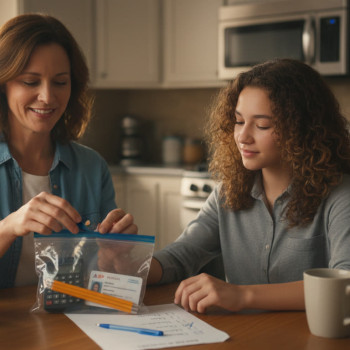Why Friend Drama Feels Bigger During AP Season
There’s something about AP season that makes everything feel amplified. Between looming exams, cumulative projects, and the pressure to perform, the emotional thermostat in a classroom seems to spike. A tiny disagreement about study groups can feel like betrayal. A canceled coffee plan can feel like a sign that the friendship is crumbling. It’s normal. You’re not overreacting — your brain is doing what brains do when stressed: magnifying threats and narrowing focus.
But normal doesn’t mean inevitable. That heightened sensitivity is manageable. With a mix of emotional awareness, practical study strategies, and a few communication tools, you can keep friendships intact and your scores on track. This guide is written for AP students who want realistic ways to handle friend drama without burning bridges or burning out.

Understand the Stakes: What’s Really Going On
Before you respond to drama, take a moment to decode what’s driving it. There are usually three overlapping forces:
- Academic pressure: AP classes are cumulative and often inflexible. That pressure leaks into relationships.
- Fear of missing out (FOMO): When study groups form or plans shift, it can trigger worries about belonging.
- Time scarcity: You have less bandwidth; patience and perspective get used up faster.
Labeling the forces at play (yes, even silently to yourself) will help you respond with intention instead of reacting from adrenaline.
Quick Emotional First Aid: 5 Steps to Cool Down
When a drama flare-up happens—someone ghosts you about a study session, a friend snaps under stress, or gossip starts—try this immediate triage before taking any action:
- Pause: Take three slow breaths. This small break reduces impulsive replies.
- Check your trigger: Ask: Is this about me or about their stress?
- Timebox your reaction: Give yourself a window—30 minutes, an hour—to calm down before responding.
- Default to curiosity: Instead of assuming malice, think: What might I be missing?
- Choose your channel: Sensitive conversations deserve face-to-face or voice calls, not rapid-fire texts.
Quick Example
You’re told last-minute that the study group is full. Your first thought might be, “They left me out.” Pause, breathe, and remind yourself: maybe the group size changed. Send a short, neutral message: “Hey—saw the group filled up. Do you have quick notes I can review later?” That keeps doors open while you protect your focus.
Communication That Keeps Friendships and Focus
Clear, calm communication is the single most effective tool for navigating drama. Here are practical scripts and strategies you can adapt.
When You Need to Set Boundaries
Boundaries aren’t mean; they’re maintenance. During AP season you might need to say no to late-night chats or social plans that sap your energy.
- Script: “I care about hanging out, but I’m studying for an AP exam this week. Can we catch up after Friday?”
- Why it works: It’s direct, kind, and offers an alternative—so it doesn’t sound like rejection.
When You’re Hurt But Want to Stay Friends
- Script: “I felt left out when I wasn’t invited to the study session. I’d love to be included next time—can we plan that?”
- Why it works: It uses “I” language, which reduces defensiveness, and it focuses on future solutions.
When a Friend Is Overwhelmed and Taking It Out on You
- Script: “I can tell you’re stressed. I’m here if you need to vent, but I don’t like being spoken to that way. Can we take a breather?”
- Why it works: Acknowledges their feelings while holding your boundary.
Practical Study Structures That Reduce Social Friction
Some drama comes from simply not having a system. Agreeing on structure ahead of time prevents misunderstandings and preserves friendships. Here are models you can try and adapt.
Study Group Formats
- Focused Sprint: 25-minute study, 5-minute break. Rotate who picks the sprint topic.
- Teach-Back: Each person presents a 10-minute summary of one topic, then Q&A.
- Problem Clinic: Bring one tough problem each; the group helps every person solve theirs.
How to Coordinate Without Drama
- Use a simple shared doc to list topics and volunteers.
- Limit group size to 3–5 people to keep sessions efficient.
- Set expectations up front: start time, end time, and whether it’s mandatory to prepare.
When to Let Go: Deciding What’s Worth Fighting For
Not every slight needs explanation. Part of emotional maturity is deciding when a relationship is worth repair, when it needs boundaries, and when it’s time to step away.
Use this quick decision grid to evaluate conflicts:
| Question | If Yes | If No |
|---|---|---|
| Is this a one-off mistake? | Consider forgiving and clarifying. | Look for patterns before investing energy. |
| Does this affect my well-being or safety? | Address immediately and firmly. | Handle with perspective; prioritize studying. |
| Is this person supportive overall? | Repair with honest conversation. | Reconsider closeness and set limits. |
The grid isn’t a rulebook. Think of it as a quick filter to stop drama from becoming the main storyline of your AP season.
Self-Care That Actually Fits Into a Busy AP Schedule
Self-care in AP season shouldn’t be another chore. It needs to be tiny, achievable, and restorative so your brain can regulate emotions and study better.
- Mini resets: Two minutes of stretching, a 90-second outside breath, or a quick playlist of three calming songs between study blocks.
- Sleep as study strategy: Prioritize rest—consolidation happens while you sleep and helps reduce reactivity.
- Snack smart: Protein and water beat endless caffeine spikes that worsen mood swings.
A Realistic Daily Routine
- Morning: 10–20 minutes of review on your hardest topic.
- Afternoon: One focused study block (60–90 minutes) and a short walk.
- Evening: Light review and prep for tomorrow; turn off screens 30 minutes before bed.
Leveraging Support: Teachers, Counselors, and Tutors
You don’t have to handle everything on your own. When friend drama bleeds into your ability to study, bring in trusted adults or resources. A quick, private check-in with a teacher can clear misunderstandings about group work. A counselor can help with persistent relationship stress. And when academic stress magnifies social tension, targeted tutoring can restore confidence.
Sparkl’s personalized tutoring, for example, can complement your recovery from drama by offering 1-on-1 guidance, tailored study plans, and expert tutors who help rebuild academic confidence. Sometimes knowing your content is solid reduces the emotional charge of conflict—when you feel prepared, small dramas feel smaller.
Real Stories and Practical Wins
Here are two short, anonymized vignettes you might recognize—and how they resolved drama without derailing scores.
Case 1: The Last-Minute Group Switch
Lina was left out of a study group the night before a big AP exam. She felt betrayed and texted angrily. The group leader, surprised, thought Lina had declined earlier. After a calm voice call where Lina explained she hadn’t declined, they agreed on a quick catch-up plan and split notes. Result: Lina stayed connected and went into the exam with key gaps patched.
Case 2: The Burnout Snap
Marcus snapped at his friend in the library after two sleepless nights. The friend felt hurt. Marcus apologized the next day, explained how overloaded he was, and scheduled a low-stress coffee after exams to reconnect. Result: the friendship recovered and Marcus learned to ask for short, immediate breaks before resentment built up.
Conflict Scripts: Short, Tested Phrases to Use
When emotions are high, short, clear language prevents escalation. Here are compact scripts you can copy and adapt.
- “I’m upset about this. Can we talk in 30 minutes so I can be calm?”
- “I want to understand. What happened from your perspective?”
- “I need time to study right now. Can we revisit this after my exam?”
- “I felt hurt when X happened. I’d like that to change.”
- “I’m sorry I snapped. I was stressed, not at you.”
Long-Term Friend Maintenance: Habits That Protect Relationships
If you want friendships to survive AP season—and beyond—treat them like projects with small, regular maintenance tasks, not dramas that require big reactions.
- Weekly check-ins: A 10-minute call or message asking, “How are you holding up?”
- Micro celebrations: Celebrate small wins—third practice test done, or a hard topic finally understood.
- Shared study rituals: A shared playlist, a weekly problem set, or a group test run that becomes a neutral, meaningful activity.
When Drama Is Bullying or Persistent Harm
If what you’re experiencing goes beyond normal conflict—repeated exclusion, harassment, or anything that harms your well-being—take definitive steps:
- Document incidents with date and short notes.
- Speak to a trusted adult: a counselor, teacher, or parent.
- Use school reporting systems when appropriate.
Protecting your safety and mental health is non-negotiable. AP season is temporary; your safety and future are permanent priorities.

How to Rebuild After a Bigger Fallout
Sometimes a friendship fracture is bigger than a single apology. If you want to repair a significant rift, try a staged approach:
- Private reflection: Identify your role and what you want—repair, distance, or something in between.
- Initiate a low-stakes contact: A short, neutral message opens the door: “I’d like to talk when you’re ready.”
- Use a reconciliatory meeting: Face-to-face or voice chat, not text. Keep it brief and focused on feelings and solutions.
- Create a new covenant: Agree on small, realistic changes—like how you’ll study together or handle disagreements—then check in after a week or two.
Repair takes time. Both people need to show consistent small actions. If the other person isn’t willing, accept that as a boundary and redirect energy to relationships that are reciprocal.
Balancing Grades and Relationships: A Practical Planner
Here’s a simple planner to help you allocate emotional and study energy during AP season. Use it as a weekly reality check.
| Item | Time Commitment | Why It Helps |
|---|---|---|
| Focused study block | 60–90 minutes | Deep work improves retention and reduces last-minute panic. |
| Friend check-in | 10 minutes, 2–3x per week | Maintains connection without large time drains. |
| Self-care reset | 5–20 minutes daily | Regulates mood and cognitive function for better study. |
| Group study session | 45–90 minutes, 1–2x per week | Clarifies confusion and reduces shared anxiety. |
Final Thoughts: You’re Growing, Not Just Surviving
AP season is a pressure cooker—but that pressure often catalyzes growth. How you handle friend drama now teaches lifelong skills: conflict resolution, time management, emotional regulation, and honest communication. Those skills will matter far beyond a single exam grade.
Be patient with yourself. Some friendships will come through strengthened; others will fade—and both outcomes are part of learning who you are and what you value. When in doubt, choose clarity over passive-aggressive silence, prioritize your well-being, and remember that help—whether from school staff or a personalized tutoring service like Sparkl—can steady you when emotions threaten to take the wheel.
Quick Takeaway Checklist
- Pause and breathe before replying to drama.
- Use “I” statements and short, clear scripts.
- Agree on study structures to prevent misunderstandings.
- Protect sleep and small self-care rituals.
- Bring in trusted adults or tutors when needed.
- Decide what’s worth repairing—and when to set boundaries.
Need a Confidence Boost Before Exam Day?
If friend drama has dented your study time or confidence, consider focused support that fits your life. One-on-one tutoring with customized plans can rebuild content mastery and reduce the emotional load—so you go into your AP exam calm and prepared. Small, expert-led wins compound quickly and make both friendships and AP goals easier to manage.
Parting Note
You’re allowed to care about both your grades and your friendships. They’re not mutually exclusive. With gentle communication, practical boundaries, and smart study habits, you can steer through AP season with your relationships—and your sanity—intact. Keep perspective, be kind to yourself, and remember: you’ll look back at this season and be proud of how you handled it.















No Comments
Leave a comment Cancel